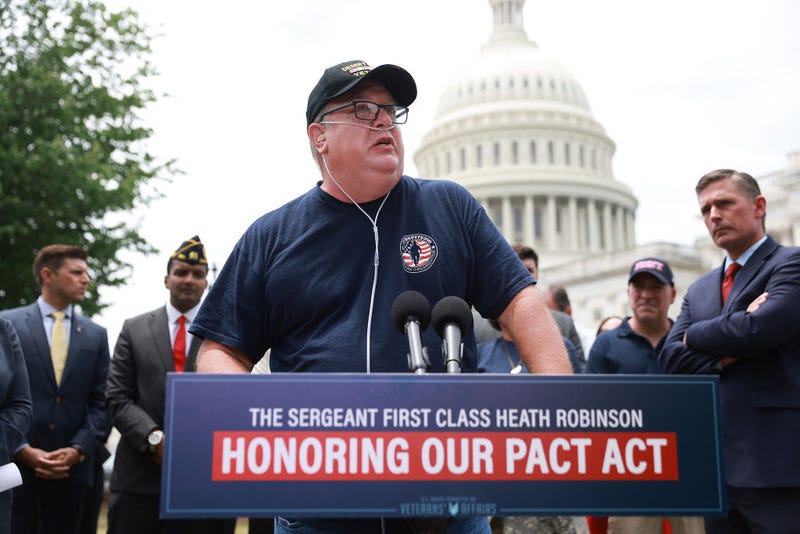
Legislation that would “finally treat toxic exposure as a cost of war,” and provide veterans improved access to benefits and healthcare is close to becoming law.
Earlier this month, a version of the Honoring Our PACT Act of 2022 (3373) was passed in the U.S. House of Representatives (342-88). Before it goes to the president’s desk to be signed into law, this version of the bill must be passed in the Senate.
Previously, a version of the legislation (3967) was passed in the House (256-174) and Senate (84-14).
“Taking care of our veterans is a cost of war. I was glad to see such a strong, bipartisan vote of over 80 of my Senate colleagues for this important bill that is going to help veterans and their families and save lives,” said Sen. Jack Reed (D-R.I.) when the Senate passed that version last month. “Let’s not waste any more time, get it done, and get these veterans, some of whom have been waiting for years, the help they need.”
A House amendment to the bill renames the bill “Sergeant First Class Heath Robinson Honoring our Promise to Address Comprehensive Toxics Act of 2022.” Robinson was exposed to burn pits while deployed to Kosovo and Iraq with the Ohio National Guard and he died from that exposure in 2020, according to Sen. John Tester (D-Mont.).
Additionally, changes remove the text of the underlying bill and insert the text of the Senate-passed version of H.R. 3967 minus a clause in Title IX, Sec. 902(e), that relates to the tax treatment of income derived from contract buyouts of health care professionals as authorized by Sec. 902 of the bill.
“Once more, the House of Representatives has made clear to America's veterans how much we value their service and sacrifice,” said House Committee on Veterans’ Affairs (HVAC) Chairman Rep. Mark Takano (D-Calif.), who sponsored the bill, when the most recent version was passed in the house July 13. “Veterans don’t want more patriotic platitudes and hollow expressions of ‘thank you for your service’ – they want action – and this Congress has delivered.”
According to Takano, the legislation will “addresses the full scope of issues affecting toxic-exposed veterans’ access to [Veterans Affairs] care and benefits, while reforming VA’s presumptive decision-making process.”
He said it will expand VA healthcare eligibility for over 3.5 million veterans who have been exposed to burn pits and establish a presumption of service connection for over 23 respiratory illnesses and cancers. It would also eliminate the requirement that veterans prove exposure to toxic substances, which Takano said has limited access to care in the past.
“I may be looking at losing my bladder in the next six months, a year, unless this next round is more promising,” said a veteran quoted by ProPublica in 2016 about the health care services offered to veterans exposed to Agent Orange.
This chemical “was a tactical herbicide the U.S. military used to clear leaves and vegetation for military operations mainly during the Vietnam War,” according to Veteran’s Affairs. Several cancers have been linked to Agent Orange exposure, as well as other conditions such as Parkinson’s disease and diabetes.
Per the bill, veterans with conditions that fall under “presumption of service” or are presumed to be caused by military service could include those who were exposed to burn pits, radiation and Agent Orange.
Veterans Affairs recently told The Hill that estimates about how many veterans who were impacted by Agent Orange should be released once the PACT Act has been passed.
“It will take several weeks to develop these projections after the final PACT Act language is received,” the agency said.
Cancer and various diseases have also been associated with radiation and exposure to 227 metric tons of hazardous waste at forward operating bases using jet fuel in large ground burn pits. According to Burn Pits 360 non-profit organization, “items burned included: batteries, medical waste, amputated body parts, plastics, ammunition, human waste, animal carcasses, rubber, chemicals,” and more.
“Exposure to these toxins, have caused a traumatic impact on the lives of our service members and their families,” said the group.
“Today’s action would not have been possible if it were not for the tireless advocacy and selflessness of toxic-exposed veterans who shared their stories and advocated for a comprehensive bill like this,” said Takano. “Tragically, many of these voices like Wesley Black, Dr. Kate Hendricks Thomas, Heath Robinson, and Jennifer Kepner are no longer with us.”
He also thanked activists such as T.V. personality Jon Stewart, who has advocated for the legislation, and politicians.
President Joe Biden is expected to sign the bill into law after it passes in the Senate.
“Importantly, the bill includes the tools and resources to ensure that the VA can effectively implement it,” he said in a statement about the legislation.
LISTEN on the Audacy App
Sign up and follow Audacy
Facebook | Twitter | Instagram


